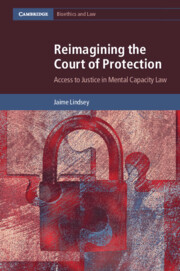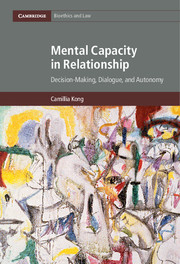Reimagining the Court of Protection
As one of the first researchers authorised to observe hearings and access court files at the Court of Protection, Jaime Lindsey offers an original account and analysis of the workings of this court. Using data collected with the approval from the senior judiciary of the Court of Protection and the Ministry of Justice, this innovative book combines empirical data with theoretical and normative analysis. It takes a socio-legal approach to understanding how the Mental Capacity Act operates in practice to achieve access to justice and situates current debates within an international context, showing how other jurisdictions have been guided by the United Nations Convention on the Rights of Persons with Disabilities. Furthering scholarship across several fields including access to justice, healthcare law and procedural justice theory, this is a timely and pioneering book that argues for a reimagining of the Court of Protection.
- Based on original empirical data to which few other researchers have been allowed access
- Offers an example of how to conduct socio-legal empirical research about the practice of mental capacity law in an ethical way
- Combines empirical data with innovative theoretical insights, furthering understanding of procedural justice theory in an under-researched area
Reviews & endorsements
‘[This volume] does an excellent job in writing people with impaired capacity into socio-legal discourse on access to justice. It also showcases the essential contribution of socio-legal methodologies in informing ongoing debates in disability and capacity law.’ Mary Donnelly, Journal of Law and Society
Product details
June 2024Paperback
9781108995030
264 pages
229 × 152 × 14 mm
0.389kg
Available
Table of Contents
- 1. Introduction
- 2. Procedural Justice
- 3. Participation and Voice
- 4. Mediating Disputes
- 5. Expert and Experiential Evidence
- 6. The Courtroom Space and Design
- 7. Conclusions: Designing for Access to Justice.






